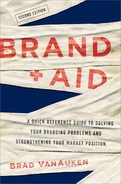1
a brand is a friend
Business leaders talk about the importance of maintaining strong brand equity, but is there consensus on what brand equity is? Some people say it’s everything associated with the brand that adds to or subtracts from the value it provides to a product or service. Others emphasize the financial value of the brand asset. Still others stress the consumer loyalty or price premium generated by brand equity. Some even talk about the permission and flexibility a brand gives an organization to extend into new product and service categories. While all of these opinions are very important parts of brand equity, I think the following story best illustrates what brand equity is.
Imagine you are having lunch with a longtime and very good friend. Several times throughout the lunch, she makes disparaging and sarcastic remarks that make you feel bad. You think to yourself, “This just isn’t like her. She must be having a bad day.” You meet with her again a week or two later, and again she acts ornery and negative. You think to yourself, “Something must be going on in her life that she’s really struggling with. Maybe she is having difficulties with her job or her health or her marriage or her children.” You may even ask her if everything is all right. She snaps back, “Of course it is.”
Your interaction with her continues in this vein over the next couple of months. You continue to try to be supportive, but she’s definitely getting on your nerves. After many meetings and much interaction, you finally decide that she’s a changed person and someone with whom you prefer to spend less and less time. You may get to this point after a few months, or perhaps even after a year or more. She doesn’t change, and eventually the relationship peters out.
Now consider for a moment that the person you first had lunch with is the same person as before, with one exception: She is a total stranger to you. You haven’t met her previously and she is not your dear friend. I would guess that after enduring many caustic comments and being insulted a few times at that lunch, your first impression wouldn’t be very positive. In fact, you’d probably be inclined not to get together with that person again. You’d probably walk away from that lunch thinking, “What a miserable person. I hope I don’t run into her again.”
In both of these scenarios it is the same person behaving the same way in the same situation. Yet in the first scenario, you are very quick to forgive the behavior. In fact, you feel a lot of concern toward her. In the second scenario, you can’t wait for the lunch to be over and you hope never to see the person again.
In the first scenario, the person was a longtime good friend. She had a lot of equity with you. In the second scenario, she had no equity at all. You see, if people or brands have a lot of equity—that is, if you know, like, and trust them—you will “cut them a lot of slack” even if they repeatedly fail to meet your expectations. If a person, product, service, or organization has no equity with you, no emotional connection, and no trust, then you are much less inclined to forgive unmet expectations.
DID YOU KNOW?
“Familiarity … more often breeds liking.”
(Source: Raj Raghunathan, Ph.D., Sapient Nature, January 17, 2012.)
Declining brands tend to lose buyers while the brands’ loyalty and purchase rates stay stable among remaining buyers.
(Source: Andrew Ehrenberg, “Description and Prescription,” Journal of Advertising Research, November/December 1997, p. 19.)
In most product categories, price is the primary purchase incentive for no more than 15 percent to 35 percent of all customers.
(Source: Kevin J. Clancy, “At What Profit Price?” Brandweek 38, no. 25, June 23, 1997, pp. 24–28.)
Brand equity creates a relationship and a strong bond that grows over time. It is often so strong that it compensates for performance flaws, whether an out-of-stock situation, poor customer service, a product that falls apart, inconvenient store hours, or a higher-than-average-price. In the end, you want to deliver good quality and good value, innovation, relevant differentiation, convenience, and accessibility with your brand. However, we must never forget that building brand equity is like building a close friendship. It requires a consistent relationship over time, trust, and an emotional connection.
TEN SIGNS THAT PEOPLE DO NOT UNDERSTAND MARKETING
1. They never think about the customer and that individual’s motivations and needs.
2. They define marketing as sales support.
3. They use the terms sales and marketing interchangeably.
4. They use the terms marketing and advertising interchangeably.
5. They think about marketing as a cost center or overhead rather than as an investment.
6. They only think of marketing as its tools and tactics, not as an integrated process that delivers on a strategy.
7. There is no well-thought-out media plan.
8. They believe marketing should copy whatever the competitors are doing.
9. They think anyone can do marketing, ignoring that it is a discipline based on training and experience.
10. They can’t see the link between marketing strategy and business strategy.
